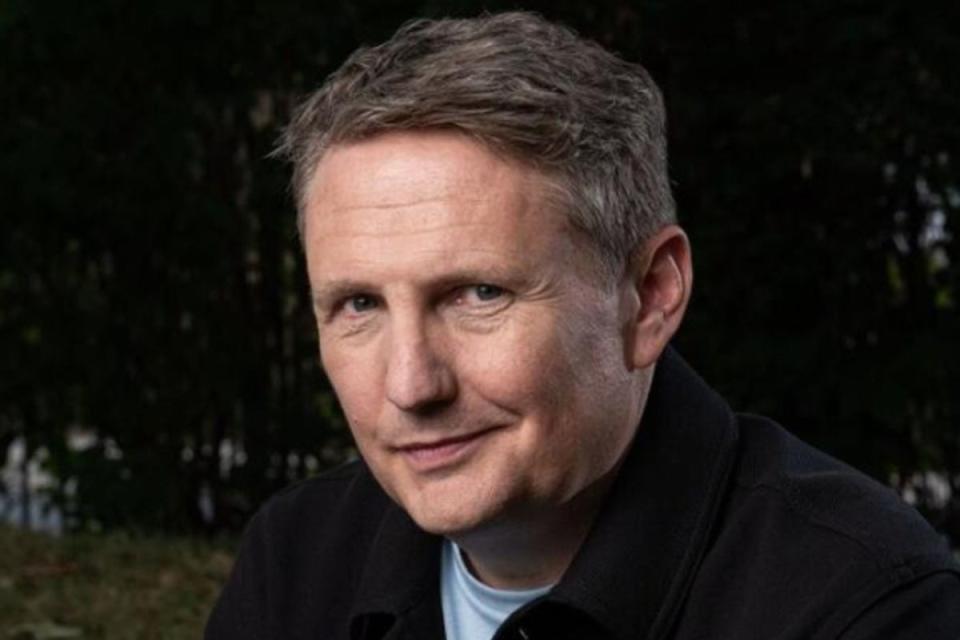My Sexual Abuse: The Sitcom review – a unique, bruisingly raw excavation of trauma

“Mark, why are you doing this?” Mark O’Sullivan asks himself this in the opening moments of My Sexual Abuse: The Sitcom. It’s a fair question, and one that you can imagine the comedian and writer’s close circle posing to him before he embarked on this bruisingly raw excavation of trauma. There are very few people who would feel comfortable opening up on national TV about being sexually abused as a child. There are even fewer who’d sign up to create a sitcom about their experience (as opposed to, say, a darkly comic drama in the vein of Baby Reindeer or I May Destroy You). Fewer still would make a film about that whole process.
But that’s exactly what O’Sullivan has done. When he was a boy, he was abused by a member of his extended family. Decades later, when he was in his thirties, he gave evidence in a court case that eventually led to his abuser being convicted. Now he has written a short comedy episode about those events, in the artificial, “deliberately cartoonish” style of an Eighties family sitcom, and has invited a Channel 4 camera crew to capture its making. The result is a curious, confronting cross between documentary and public therapy session, with some dark punchlines thrown in too. All of this grapples with the question: how can you find humour in something so horrifying?
First, though, O’Sullivan must “go back into [his] past”. In one of the first scenes, we see him looking back at a photo showing him as a smiling young boy, taken during a family holiday; he can immediately tell that it was captured before the abuse started, “in the pre-it-happening part”, because he looks so carefree.
But although he can clearly divide his childhood into before and after the abuse, a meeting with a family friend, Toni, shows how effectively he managed to mask that trauma. She admits that she never noticed any changes in his behaviour – and if she had done, she would have taken him in. It’s devastating, but there’s a moment of gentle humour to lighten this heartbreaking moment. When O’Sullivan tells her his sitcom plans, she responds with a very polite, mildly baffled: “Oh, right!”
The cameras then follow him into the rehearsal room, to grapple with some of his creative choices. Why does he think that the sitcom, a form associated with canned laughter and creaky sets, is the best medium to capture the darkest parts of his life, something he admits he has thought about every day since it happened? Because, he reckons, it’s a good way to show that “it can and does happen anywhere, to anyone” – even in an ostensibly normal, cheery family home. Why present “Steve”, the fictionalised version of his abuser, as a man wearing a teddy bear costume? It’s not entirely clear, but it certainly gives the whole thing a nightmarish quality.

His decision to cast comedian Cariad Lloyd in the double role of his aunt and the defence barrister is particularly poignant. The barrister who made him relive the abuse during an “awful and traumatic” cross-examination is the obvious bad guy of the piece. But in real life, it was his aunt, once one of his favourite relatives, who became a villain too – because she didn’t believe him when he eventually opened up to his family. The court case, we learn, “cut the family in half”, with some of them siding with O’Sullivan’s abuser.
The resulting comedy show is a bit patchy, but that’s not really the point. It’s the process – and the possibility of catharsis – that makes for fascinating if uncomfortable watching.
If you are a child and you need help because something has happened to you, you can call the NSPCC free of charge on 0800 1111. You can also call the NSPCC if you are an adult and you are worried about a child, on 0808 800 5000. The National Association for People Abused in Childhood (Napac) offers support for adults on 0808 801 0331
Rape Crisis offers support for those affected by rape and sexual abuse. You can call them on 0808 802 9999 in England and Wales, 0808 801 0302 in Scotland, and 0800 0246 991 in Northern Ireland, or visit their website at www.rapecrisis.org.uk. If you are in the US, you can call Rainn on 800-656-HOPE (4673)


